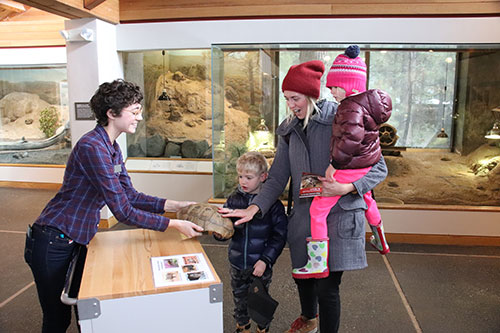IMLS’s largest museum grant program supports museums of all sizes and disciplines in strategic, project-based efforts to serve the public.

Washington, DC—The Institute of Museum and Library Services (IMLS) has announced the FY24 recipients of its largest museum grant funding opportunity, Museums for America (MFA). One hundred and fifteen museums of diverse sizes, disciplines, and geographies will receive support for strategic, project-based efforts to serve the public through exhibitions, educational/interpretive programs, digital learning resources, professional development, community debate and dialogue, audience-focused studies, and/or collections management, curation, care, and conservation. In total, the program’s FY24 awardees will receive $23,361,915 in federal funding.
This year, IMLS saw an increase in MFA grant applications requesting funding for projects related to America250. America250 is the nationwide commemoration of America’s 250th anniversary in 2026 led by the U.S. Semiquincentennial Commission. IMLS is proud to support these institutions as they share America’s history, and where we stand today.
“IMLS remains committed to serving the museum field and furthering the goals of the American public,” said IMLS Acting Director Cyndee Landrum. “The Museums for America program encourages applicants to be creative in their response to challenges, and to envision a bold future for their institution.”
All awarded MFA projects can be found on the IMLS website. Four of this year’s awardees are detailed below:
-
Denver Art Museum will create a welcoming environment for people of diverse backgrounds, abilities, and perspectives and enable museum visitors with disabilities to access the museum on their own terms. Project activities will include increasing staff’s understanding of disabilities to mitigate accessibility barriers at the museum; actively engaging individuals with disabilities to learn from their experiences visiting the museum; convening a working group to generate ideas for accessibility prototypes; fabricating and testing the prototypes; and hosting a community curated showcase. Progress will be adjusted based on findings from a process evaluation, which will help the museum field and visitors get a behind the scenes look at community driven design solutions. As a result, the museum will provide a platform for individuals with disabilities to share their stores and expertise in the development of designs that serve disability communities and the museum field.
-
New York Botanical Garden will implement the second phase of its Therapeutic Horticulture and Rehabilitative Interventions for Veteran Engagement (THRIVE) program to provide horticultural therapy programming for local veterans. In partnership with the Resilience and Wellness Center in the Bronx-based James J. Peters Veterans Administration Medical Center, the garden's Edible Academy will expand services and outreach for participating veterans and THRIVE alums. Program participants will learn about plants and nutrition by growing, harvesting, preparing, and consuming fresh produce with horticultural therapy specialists. The garden will hold a symposium with cultural institutions, horticultural therapy specialists, and veterans' organizations to share strategies and best practices informed by the THRIVE program, and staff will present findings and share information about horticultural therapy intervention for veterans at professional conferences and via new digital resources.
-
Heinz History Center will process, rehouse, and digitize the African American collections held in their library and archives. These collections document African American life and culture in the Western Pennsylvania region. The project will involve hiring an archivist who will work with the center’s staff to undertake the processing of the collection, improve the preservation of the collection by rehousing them in acid-free containers, and digitize and create metadata to make the collections freely accessible to the public on HistoricPittsburgh.org. In addition to improving the preservation and accessibility of the collection, this project will result in the development of programming and resources that utilize the collections, including finding aids, public presentations, educational programs, articles and blog posts, as well as the creation of six Smithsonian Digital Learning Lab collections.
-
Genesee Country Village and Museum will strengthen interpretation related to the history of enslavement in 19th century New York State. The project will focus on the educational interpretation of four historic buildings on site: the Nathaniel Rochester House, Land Office, Livingston-Backus House, and Quaker Meeting House. Staff will work with interpretive and educational consultants to create content and evaluation plans as well as to train staff on content delivery. Staff will also work with local community partners as well as both local and national subject experts to create and review in-person interpretation, exhibit, audio tour, and school program content.
Museums for America is the seventh IMLS Museum Services program to announce its FY24 awardees.
About the Institute of Museum and Library Services
The Institute of Museum and Library Services is the primary source of federal support for the nation's libraries and museums. We advance, support, and empower America's museums, libraries, and related organizations through grantmaking, research, and policy development. IMLS envisions a nation where individuals and communities have access to museums and libraries to learn from and be inspired by the trusted information, ideas, and stories they contain about our diverse natural and cultural heritage. To learn more, visit www.imls.gov and follow us on Facebook and LinkedIn.